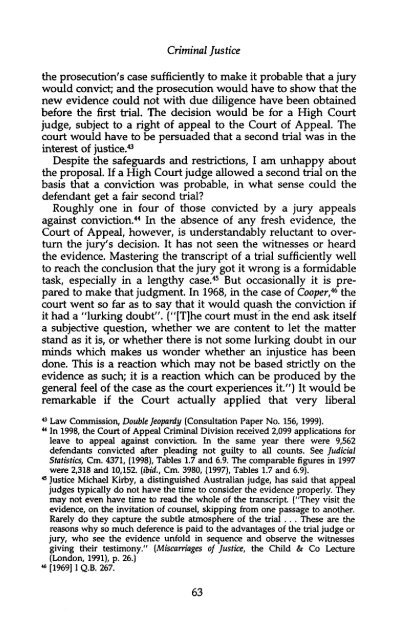HAMLYN - College of Social Sciences and International Studies ...
HAMLYN - College of Social Sciences and International Studies ...
HAMLYN - College of Social Sciences and International Studies ...
You also want an ePaper? Increase the reach of your titles
YUMPU automatically turns print PDFs into web optimized ePapers that Google loves.
Criminal Justice<br />
the prosecution's case sufficiently to make it probable that a jury<br />
would convict; <strong>and</strong> the prosecution would have to show that the<br />
new evidence could not with due diligence have been obtained<br />
before the first trial. The decision would be for a High Court<br />
judge, subject to a right <strong>of</strong> appeal to the Court <strong>of</strong> Appeal. The<br />
court would have to be persuaded that a second trial was in the<br />
interest <strong>of</strong> justice. 43<br />
Despite the safeguards <strong>and</strong> restrictions, I am unhappy about<br />
the proposal. If a High Court judge allowed a second trial on the<br />
basis that a conviction was probable, in what sense could the<br />
defendant get a fair second trial?<br />
Roughly one in four <strong>of</strong> those convicted by a jury appeals<br />
against conviction. 44 In the absence <strong>of</strong> any fresh evidence, the<br />
Court <strong>of</strong> Appeal, however, is underst<strong>and</strong>ably reluctant to overturn<br />
the jury's decision. It has not seen the witnesses or heard<br />
the evidence. Mastering the transcript <strong>of</strong> a trial sufficiently well<br />
to reach the conclusion that the jury got it wrong is a formidable<br />
task, especially in a lengthy case. 45 But occasionally it is prepared<br />
to make that judgment. In 1968, in the case <strong>of</strong> Cooper, 46 the<br />
court went so far as to say that it would quash the conviction if<br />
it had a "lurking doubt". ("[T]he court must in the end ask itself<br />
a subjective question, whether we are content to let the matter<br />
st<strong>and</strong> as it is, or whether there is not some lurking doubt in our<br />
minds which makes us wonder whether an injustice has been<br />
done. This is a reaction which may not be based strictly on the<br />
evidence as such; it is a reaction which can be produced by the<br />
general feel <strong>of</strong> the case as the court experiences it.") It would be<br />
remarkable if the Court actually applied that very liberal<br />
43 Law Commission, Double Jeopardy (Consultation Paper No. 156, 1999).<br />
44 In 1998, the Court <strong>of</strong> Appeal Criminal Division received 2,099 applications for<br />
leave to appeal against conviction. In the same year there were 9,562<br />
defendants convicted after pleading not guilty to all counts. See Judicial<br />
Statistics, Cm. 4371, (1998), Tables 1.7 <strong>and</strong> 6.9. The comparable figures in 1997<br />
were 2,318 <strong>and</strong> 10,152. {ibid., Cm. 3980, (1997), Tables 1.7 <strong>and</strong> 6.9).<br />
45 Justice Michael Kirby, a distinguished Australian judge, has said that appeal<br />
judges typically do not have the time to consider the evidence properly. They<br />
may not even have time to read the whole <strong>of</strong> the transcript. ("They visit the<br />
evidence, on the invitation <strong>of</strong> counsel, skipping from one passage to another.<br />
Rarely do they capture the subtle atmosphere <strong>of</strong> the trial . . . These are the<br />
reasons why so much deference is paid to the advantages <strong>of</strong> the trial judge or<br />
jury, who see the evidence unfold in sequence <strong>and</strong> observe the witnesses<br />
giving their testimony." [Miscarriages <strong>of</strong> Justice, the Child & Co Lecture<br />
(London, 1991), p. 26.)<br />
46 [1969] 1 Q.B. 267.<br />
63

















